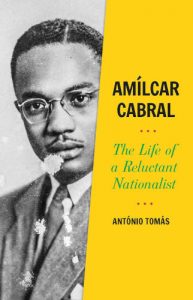The JRB presents an excerpt from António Tomás’s new book Amílcar Cabral: The Life of a Reluctant Nationalist.

Amílcar Cabral: The Life of a Reluctant Nationalist
António Tomás
Hurst Publishers, 2021
In the thinking of Cabral, shattering the wall of silence meant separating the myths of Portuguese colonialism in Africa from the reality. For as Cabral suggests, Portuguese colonialism depended to a great extent on maintaining the mythology around it. In the 1930s, paternalism, with its Darwinian undertones, was the cornerstone of Portuguese colonialism, claiming that without Europe’s intervention, Africans were condemned to stagnation, if not to barbarity and extinction. Later, however, this framework could no longer be justified, as in many parts of the continent Africans were engaged in administering their own countries. It was in this context that the theories of the Brazilian sociologist Gilberto Freyre gave new life to Portuguese colonialism through the creation of a new myth—that of luso-tropicalism.
For Freyre, Brazil was a unique society in the world and its formation was a result of the smooth blending of different elements, namely the African, the native Indian, and particularly the Portuguese, who had contributed their affectionate and malleable character. The outcome of this, Freyre argued, was not only the establishment of a racially diverse society, but also the creation of a milder colonial process, if compared to other territories in the Americas colonized by the Spanish, French, British, and Dutch. The Portuguese Estado Novo saw in Freyre’s work an opportunity to repackage the Portuguese presence in Africa. Freyre himself was invited to travel through Portuguese colonies and write about the colonial experience in Africa, which he diligently did in books such as Aventura e Rotina (Adventure and Routine). He argues that even if the Portuguese were not ‘mixing racially’ as they did in Brazil, they were still blending culturally. With the Estado Novo’s appropriation of the concept of luso-tropicalism, colonial propaganda went even further than Freyre himself to make the case for the existence of a multiracial society in the colonies.
Countering luso-tropicalism theoretically was probably the most serious concern among these nationalists, for living in Lisbon they could sense the extent to which practice diverged from propaganda. Mário de Andrade, under the pseudonym of Buanga Fele, had already addressed this issue for Présence Africaine. Andrade did not only demolish Freyre’s argument in Casa Grande and Sanzala, but he also accused the Brazilian sociologist of selling his work to the Portuguese regime. In the pamphlet, Cabral also takes up the critique of luso-tropicalism, writing that while the presence of the Portuguese in Africa had resulted in some racial diversity, it was more talked about than real. For racial miscegenation had stopped in the early 1920s with the migration to Africa of large contingents of metropolitan whites. Hence, the numbers were manifestly inferior to what was claimed in propaganda: out of 10 million inhabitants in Angola and Mozambique, only 60,000 appeared in the census as mixed race, which corresponded to less than 1 per cent of the population. In his attempt to explain Portuguese colonialism, Perry Anderson wrote that in the year 1958 in Angola, only one marriage between a white man and a black woman had taken place, a situation that could not be compared even to that of South Africa during apartheid, but more closely resembled that of the racially segregated states of Mississippi and Alabama.
Separating myth from reality equally meant denouncing the falsehoods of luso-tropicalism. For as Cabral attempted to demonstrate, in all of Portugal’s colonies, racism was hypocritically practiced, with the Portuguese justifying their permanent presence in Africa by their ‘capacity’ to mix with black people and form a multiracial community. This was, of course, a fallacy, but nonetheless it was a significant factor in Portuguese colonial policy. In the colonies with a significant white population, such as Angola and Mozambique, there were cinemas, cafes, and restaurants exclusively frequented by whites. Mixed-race couples were laughed at and few would show themselves in public. Perry Anderson added that in hospitals, white and black people stayed in separate wards, and hotels only gave jobs to whites. The Portuguese politician Almeida Santos tells in his memoirs of an episode in which, during a trip to Mozambique as a member of the academic choir Orfeão Académico de Coimbra, he refused to go to a ball hosted by the general-governor because two mixed-race sisters of his colleagues were refused entry. However, as Cabral also hinted, the more pervasive and subtle form of discrimination was economic. Wages for most black people did not grant them sufficient income to use public transport regularly or to rent a house in central urban areas.
If colonialism in all its forms and manifestations was condemnable—an undisputed notion in most of the civilized world—Portuguese colonialism, according to Cabral, was even more so, as Portugal was not even equipped to colonize. The survival of colonialism was anchored in the artificial differentiation between the colonizers and the colonized. Privileges were distributed on that basis. The colonized population was deprived of political and civic rights unless they could transition to the intermediary level of assimilado. However, in order for this to happen, the applicant had to prove economic stability, conditions of habitability, the capacity to pay taxes, and proof of military service. With a note of irony, Cabral asserts that had these regulations applied in continental Portugal, half the Portuguese would not qualify as assimilado. For he concludes, ‘if Portugal could have a civilizing influence over any people, it would be a kind of miracle. Colonialism, a dying phenomenon, has never depended on miracles to survive.’
In this document, Cabral could use the information he himself gathered during the time he spent in Africa, as well as many other sources of information condemning Portugal’s practice with the same vehemence. For data on the labor question in Angola, Cabral used Henrique Galvão’s explosive report, whose information was collected during his time as colonial inspector and representative for Angola in the National Assembly, in 1947. Galvão was not the first to denounce such practices, and his document came in a long tradition of foreigners denouncing poor, if not criminal, labor conditions in the Portuguese colonies. Galvão’s report is still in a way quite constructive, for he argues that labor conditions in Angola were the main reason for Angolans to migrate to Congo or Zambia, where they could receive better salaries. Those who stayed in Angola were simply condemned to malnutrition and physical decay, which was the cause of the high rate of child mortality.
While clearly stating the problem of colonial exploitation, Cabral’s document was too vague in terms of what was being done in order to improve the situation that he was denouncing. His pamphlet The Facts About Portugal’s African Colonies, for example, states that it is presenting the position of organizations fighting against Portuguese colonialism, but these organizations are never named. He also mentions his desire for a peaceful resolution to the colonial situation: force was only to be used if Portugal refused to negotiate the right of self-determination, in order to ‘assist the peoples represented’ by the nationalists. However, he did not give any explanation for what was meant by the ‘use of force’.
By then, Cabral was aware that his time of anonymity was over. Before the publication of Facts, he gave a press conference in London, the content of which was broadcast by some international agencies and picked up by some journals of reference, such as the French newspaper Le Monde. The results were immediate, as Viriato da Cruz enthusiastically comments in a letter: ‘the press conference Abel (Amílcar Cabral) gave was broadcast by news agencies across the world. It made the news in the Congos and Nigeria. In short, the case has alarmed the Portuguese.’
Cabral was right to point out that while the echo of the press conference did not have any impact in the Portuguese press—its content was obviously not cited in any of the Portuguese newspapers—the secret police was paying attention. While the PIDE had not been able to prove that Cabral was involved in subversive activities during his time as a student in Lisbon, things changed after London. A few months after his intervention in London, on 30 July 1960, the PIDE produced an extensive report under the title ‘Subversive Activities in Africa.’ The police had found out that Cabral, agronomist and member of the FRAIN, had been involved in the brutal events of Bissau, the massacres of Pidgiguiti in 1959. The report added that Cabral, on his way to Lisbon, had visited numerous African countries, such as the Belgian Congo, Ghana, the Republic of Congo, Senegal, and the Republic of Guinea. These trips, according to the report, were part of a strategy to convince African and Asian countries to take a position against Portuguese colonialism, since all these countries had, or were about to have, seats in the General Assembly of the United Nations.
In London Amílcar Cabral had accomplished a number of things, personally and in terms of his nationalist activism. He had clarified his position, since he was no longer working for the colonial state, and had fully taken on his revolutionary status. In this way, at least temporarily, he had also freed himself from the weight of family responsibilities that could limit his movements. More importantly, he had tapped into a diplomatic possibility, by conceiving of himself and the organizations he represented as an interlocutor in the process of negotiations with Portugal for independence. For the rest of his life he would favor this solution, even if the Portuguese colonial empire only came down through a protracted colonial war and revolution.
- António Tomás is Associate Professor in the Graduate School of Architecture at the University of Johannesburg. He holds a PhD in Anthropology from Columbia University, in New York. He has worked as a journalist in Angola and Portugal and has written extensively on issues related to Lusophone Africa.
~~~
Publisher information
A new biography of one of Africa’s seminal anti-colonial thinkers and activists.
‘Figures like Amílcar Cabral … helped us to imagine the horizons of freedom in far broader terms than were available to us through what we now call “civil rights discourse.”’— Angela Davis
On 20 January 1973, the Bissau-Guinean revolutionary Amílcar Cabral was killed by militants from his own party.
Despite Cabral’s assassination, Portuguese Guinea became the independent Republic of Guinea-Bissau. The guerrilla war that Cabral had started and led precipitated a chain of events that would lead to the 1974 Carnation Revolution in Lisbon, toppling the forty-year-old authoritarian regime. This paved the way for the rest of Portugal’s African colonies to achieve independence.
Written by a native of Angola, Amílcar Cabral: The Life of a Reluctant Nationalist narrates Cabral’s revolutionary trajectory, from his early life in Portuguese Guinea to his death at the hands of his own men.
Using recently opened state security police archives, the book details his quest for national sovereignty, beleaguered by the ethnic-based identity conflicts the national liberation movement struggled to overcome. Through the life of Cabral, António Tomás critically reflects on existing ways of thinking and writing about the independence of Lusophone Africa.






One thought on “‘He was no longer working for the colonial state, and had fully taken on his revolutionary status’—Read an excerpt from Amílcar Cabral: The Life of a Reluctant Nationalist”